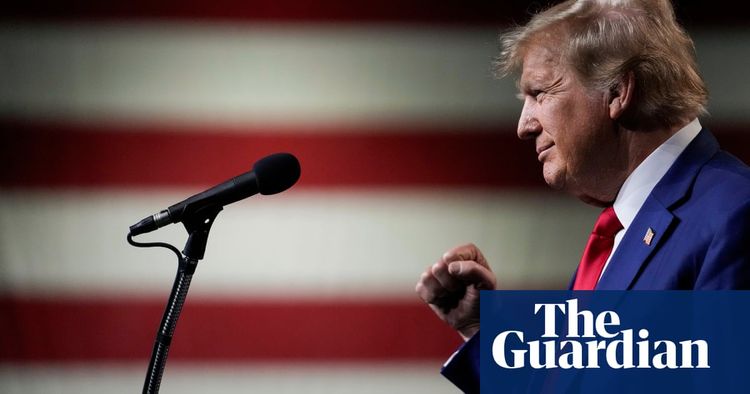Why did Colorado disqualify Trump from the state’s 2024 election ballot?

The Colorado highest court has determined that Donald Trump cannot run for the presidency in the future because of his involvement in the January 6 riot. This decision could have significant implications for the 2024 election.
The state's GOP presidential voting ballot will no longer include Trump, following a judgment based on a seldom-utilized rule mention in the US constitution called the insurrection clause.
This is the information we have collected until now, and it could have implications for the ex-president and current top contender of the Republican party.
Insurrection Clause: Purpose & Use Explained
For the initial time under the constitutional provision of the United States, a candidate has been judged unqualified for the presidency by the Colorado supreme court.
The third section of the 14th amendment is known as the insurrection clause. It prevents individuals who previously pledged to defend the constitution from Congress, the military, and federal and state offices from participating in acts of rebellion or insurrection against it.
The 14th Amendment was approved back in 1868 with the goal of securing the civil liberties of individuals who were once enslaved. It was also established to thwart any attempts by former Confederate authorities from seizing control of Congress and subsequently governing the nation that they had recently revolted against.
More and more law experts claim that Trump can be held accountable under the post-civil war clause as he attempted to invalidate the 2020 presidential election and impede the transfer of power to Joe Biden. Trump did this by prompting his supporters to invade the US Capitol building.
In a recent interview with The Guardian, Ron Fein, the legal director for Free Speech for People, expressed his concern about the possible dangers of allowing Trump to hold a public office again. He stated that the framers of section 3 foresaw these dangers, as they knew that an insurrectionist who took an oath could cause even greater harm if they regained power. Therefore, it is crucial to consider the potential consequences before allowing such individuals to hold public office again.
How Did It Occur?
On Tuesday, advocacy groups and individuals who are against Trump's presidency have achieved a successful outcome in their legal battle. They have claimed that Trump's candidacy goes against the insurrection clause, and similar challenges have been made in the past.
The lawsuit was filed by a cohort of Colorado electors, with the assistance of the organization Citizens for Responsibility and Ethics in Washington. They contended that Trump ought to be barred from the ballot due to his involvement in the assault on January 6.
The highest court in Colorado has made a new ruling which reverses a previous decision made by a district court judge. This judge had concluded that Donald Trump's actions on January 6th constituted an incitement to commit an insurrection. However, the judge also determined that Trump could not be prevented from running for office, as it was uncertain whether the clause prohibiting this was applicable to the role of the president.
Did This Occur Previously?
The law has hardly been applied before and not in a case that gained as much attention. Back in 1919, Congress declined to accept a socialist as a member of Congress due to allegations that he had provided support and assistance to the nation's enemies during World War I.
In the previous year, a rural county commissioner who participated in the events at the Capitol on January 6 was prohibited from serving in their position by a New Mexico judge using the clause for the first time.
As per the ruling, the act of removing someone from their position can be reversed with the agreement of "two-thirds of both the House".
Impact On Election Results?
The recent decision made in Colorado only affects the Republican primary elections happening on March 5th. As a result, Trump will not be listed as an option to be voted for during that particular race.
However, the outcome could potentially impact Trump's position for the upcoming statewide election scheduled for November 5th.
Additionally, the decision could have an impact on other legal cases throughout the United States. Currently, supreme courts in states such as Minnesota and Michigan, a state known for its crucial role in elections, are deliberating comparable contentions.
Supporters have been aiming to utilize this specific case to enhance a broader disqualification campaign and potentially present the matter to the highest judicial body in the United States.
Did Trump Reply Yet?
During a rally in Waterloo, Iowa on Tuesday, Trump didn't bring up the decision. However, his campaign sent out a fundraising email that referred to the ruling as "tyrannical".
Meanwhile, his legal representatives have contended that the wording of the 14th amendment is not relevant to the position of the president. They have expressed their intention to challenge any ruling of disqualification and pursue the matter further to the US supreme court, which holds ultimate jurisdiction over constitutional issues.
Trump's attorney claimed that the Capitol riot on January 6th was not severe enough to be considered an insurrection. Moreover, the attorney argued that anything Trump might have said to his followers in Washington that day was protected under the Constitution's free speech provisions. According to the lawyer, the courts lacked the power to bar Trump from running for office.





































































